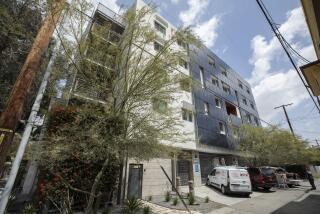A Tradition Falls, Land Rents Rise in Egypt
- Share via
SINAYER, Egypt — Here in the timeless lushness of the Nile Valley, where peasants in flowing robes pour the river’s life-giving waters onto the dark, silty soil to bring forth a bounty of cotton, dates and corn, trouble is coming.
It is not a plague of locusts or a flood, perils these lands have known since the time of the pharaohs.
No, it is a piece of modernizing legislation--call it Adam Smith comes to Egypt--introducing the startling notions that landowners should have a say over who works their property and that they should have the right to receive market-value rent.
For Egypt’s peasants, the humble fellaheen, these are strange times. In the 1950s and ‘60s, during the rule of President Gamal Abdel Nasser, when socialist ideals marched triumphant across the Third World, they were promised low, government-set rents and tenure for themselves and their heirs on the land.
Forty years later, the pendulum has swung. The reigning philosophy now is free-market economics, and long-suffering landowners are eager to get back control of their property.
The fellaheen--a pillar of Egyptian tradition--see the new law as a threat to their very existence.
“We won’t leave the land, and we will slaughter them if they come to take it,” threatened Mohammed Ali, a tenant farmer in Sinayer, a village in Beni Suef province three hours’ drive south of Cairo.
In the past, farmers such as Ali might have counted on Egypt’s fabled inertia to ensure that nothing would change. But now, they are confronting a government bent on accelerating market reforms with an alacrity that some might deem un-Egyptian: Officials are racing to privatize businesses, reclaim desert land, upgrade the infrastructure and attract foreign investors.
The government, which estimates that its policies led to 5% growth in the 1996 gross domestic product, now dreams of becoming the economic tiger of the Mediterranean.
So it is no wonder that in the countryside, emotions are boiling, blood has been spilled--at least seven people have been killed in rioting--and the law’s opponents are warning of a peasant uprising if the measure takes effect as scheduled Oct. 1.
The new law was aimed at rectifying an anti-owner bias in Nasser’s sweeping land reforms. Until Nasser, Egyptian agriculture had been characterized by a quasi-feudal system in which large estates were worked by impoverished peasants whose livelihood depended on the whim of the owners and their overseers.
Nasser broke up the large plantations, nationalizing the biggest estates and banning anyone from owning more than 200 acres. Tenants were given the right to till the land where they had lived in return for a nominal, government-set rent, and this entitlement could be passed down to their descendants.
Transition Period
The new legislation, Law No. 96, was passed in 1992. It included a five-year transition period during which annual rents were to be raised in stages until they reached 22 times the real estate tax on the land. During the transition, land leases could be terminated voluntarily if tenants were compensated by landlords; otherwise, tenants could renew their leases, but at new, higher market rents negotiated with landlords.
But few tenants have taken either option.
In this village, most peasants claim that they had no idea that the new law was coming, and now many dread the prospect of eviction.
Ali said the 1 1/2 acres he and his family farm annually for about $175 feeds 18 people, and that all will starve if they must leave the land. He fears that his landlord will evict him under the new law, or demand at least twice as much money, a rent he says would be far beyond his means. (No one really knows what will happen to rents on the free market, but government experts contend that increases will not be so steep because the rents have already been raised to fair market levels.)
Ali’s neighbors had similar tales, and vied with each other to report who had the tiniest plot with the largest family; some asserted that they cannot pay even the relatively low government-mandated rents now.
Ahmed Ibrahim, Ali’s brother, tugged angrily at his soiled robe, saying it is the only garment he owns. Their mother, Karima Said, 58, stood amid the ripening cotton plants and complained, “Am I to be a beggar on the streets?”
Authorities reject such concerns. They blame what they term a needless panic on leftist political parties, which philosophically oppose economic reform, and Muslim extremists, who are eager to exploit any discontent in their aim to bring about an Islamic state.
“Most of the fears [about the effects of the new law] are quite exaggerated,” Ahmed abu Zeid, the ruling National Democratic Party’s parliamentary leader, told the country’s semiofficial weekly newspaper, Al Ahram.
Defenders of Law No. 96 say it makes vital corrections in the landlord-tenant relationship, actions necessary for Egypt to have a rational, modern economy. Supporters also contend the measure will ensure that Egypt’s land is more productive than now, divided as it is into a multitude of tiny plots unsuited to mechanization. This is a critical concern in a country of 61 million where virtually the entire population is crowded onto a narrow strip of irrigated land that runs along the Nile and through the desert.
According to government estimates, up to 6 million people depend on the tilling of rented land to live. In theory, these people could be evicted if landowners took advantage of Law No. 96 to repossess their property.
Moving Too Fast?
This possibility leads some analysts to question whether, at least on this aspect of his economic reforms, President Hosni Mubarak’s pro-market government is moving too fast.
“In a country with a relatively weak employment market, high underemployment and a fairly fragile political environment, quickly freeing up a large number of people from the countryside could be, well, problematic,” Paul Sullivan, an economics professor at the American University of Cairo, warned in a piece in Business Monthly, a publication of the American Chamber of Commerce in Egypt. “Shock therapy usually does not work in Egypt, a traditional society that doesn’t value sharp and rapid changes.”
Islamic extremism could be the ultimate beneficiary of Law No. 96, said Abdel Mawla Ismail of the Land Center for Human Rights, a nongovernmental organization active in agricultural owner-tenant disputes. He said that rural Egyptians, cast from the land and lacking jobs, might easily join the ranks of the government’s violent opponents.
The explosive potential of Law No. 96 is evident in Sinayer, a hot, dusty village of narrow, unpaved lanes and mud-daubed houses whose only ornaments are brightly painted doorways. Surrounded by verdant fields, Sinayer is picturesque from a distance but filthy and poor up close.
On its streets--where braying donkeys are tethered outside many homes--can be seen men with yellowing teeth, old women with gold rings in their noses, and sickly-looking children. The community, with its small mosque and shop barren of most goods, has no schools, telephones or running water.
The area surrounding the town has been a hotbed of resistance to Law No. 96. Residents gathered noisily in the street to gawk at foreign visitors, then vowed they would never be evicted. They seemed incredulous that their government would even consider pushing them off the land where they have always lived. They complained that they have not been told enough about Law No. 96 but also boasted that they had been throwing out, unread, letters about it from their landlords.
“We think there is no way our government will do this to us!” shouted one man. “Our government is wise. . . . All we want is to eat every day.”
Violent Protests
In nearby Saft el Arfa--where police with ancient-looking rifles prevented a Times reporter from conducting interviews--tenants have been more aggressive. In late June, they burned down an agricultural cooperative building in protest.
Farther to the south, near the Nile River city of Minya, farmers rioted July 1 and government security forces opened fire. Three people, including a 70-year-old farmer and a 14-year-old boy, were killed, and 13 were wounded.
Violent protests over Law No. 96 have been breaking out sporadically since early this year, and critics say they will only increase until the Oct. 1 deadline. State-run farm cooperatives have been sacked and set ablaze, roads have been blockaded, and train traffic has been briefly halted when farmers lighted fires on the tracks.
In some cases, landowners have been attacked. In March, a family in the Fayoum governorate accidentally killed a worker while shooting guns in the air to celebrate an eviction. Enraged tenants surrounded the property owners and killed three of them before police could intervene.
To curb demonstrations, security forces have arrested troublesome farmers as well as some writers and political activists who support the farmers’ cause; news reports suggest that at least 150 people have been jailed in such circumstances.
Meanwhile, the government has said it will not immediately evict tenants from state-owned agricultural land, suggesting that private landlords might want to take the same moderate course. Mubarak also has said that ousted tenants--who he estimated will be only 5% of the total--will be able to get easy government loans to acquire land being reclaimed from the desert under new irrigation projects.
But authorities show no sign of retreating from Law No. 96 itself.
“I would bet all my money that would not happen. This is actually a test of credibility of the government,” said Mahmoud Mohielden, senior economist with the Egyptian Center for Economic Studies and an advisor to the minister of state for economic affairs. “The main question is if we are really a market economy or if we are still captive to the ideas of the 1950s and 1960s. It is not really fair to liberalize part of the economy and not liberalize another part.”
He dismissed the most dire forecast from the law’s critics--that millions of Egyptians will be evicted. But he did concede that there could be “some increases in unemployment here and there.”
Landowners argue that while their tenants may appear poor, many have lived reasonably well under previous measures that caused owners to suffer. Landowners say that government-set rents were so low that tenants could afford to be inefficient, not bothering to cultivate all the land they controlled or even subleasing it to others.
Public Haggling
“Tenants have money. For years, they have been paying low rents even though the income they get from the land is high,” said Mahmoud Attia Omar, a landowner in Damas, in the fertile delta north of Cairo.
Until the 1992 law was passed, he said, he got less than $500 a year from tenants farming his family’s 18 acres; the land, however, produced crops worth nearly $15,000 a year. Any owner who wished to sell his land, meanwhile, was required to split the proceeds with his tenants.
Amin Abazza, another landowner, pointed out that more owners farm their property than lease it. Those who will be most affected by Law No. 96, he said, will be absentee owners of small parcels. They often are urban professionals, doctors or lawyers who inherited two- or three-acre plots and exercise little control over them; they often get only token rents now.
Based on this scenario, Abazza said, he considers the protests about Law No. 96 to be largely theatrics--the loud, public haggling before tenants and owners sit down and settle on fair market rents. Claims by tenants that they will fight to the death, he said, are just “stupid rhetoric,” and he predicted that at day’s end all will see that “we are a people whose bark is much louder than their bite.”
More to Read
Sign up for Essential California
The most important California stories and recommendations in your inbox every morning.
You may occasionally receive promotional content from the Los Angeles Times.













